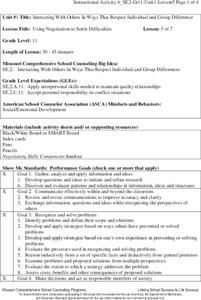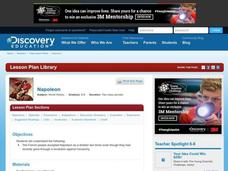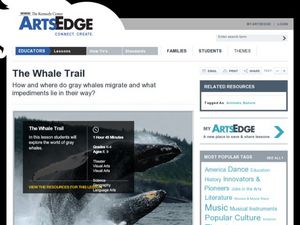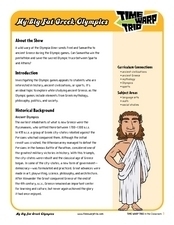Missouri Department of Elementary
Using Negotiation to Settle Difficulties
Negotiating can be a win/win experience if the involved parties apply the skills and techniques offered in a lesson plan about negotiating to settle differences.
Administrative Office of the US Courts
Elonis v. U.S.
With the explosion of social media sites, with online threats and cyber bullying, issues of freedom of speech have taken on a whole new aspect. Elonis v. U.S. represents the first time the Supreme Court has considered whether or not...
Curated OER
Long Island Sound - A Research Skill Approach
Eighth graders examine the characteristic of Long Island Sound. In groups, they use the internet to describe how the Sound formed and what environmental changes have altered it. They also discover what humans have done to affect the...
Curated OER
Voice of History
Way before the digital age radio was the medium of popular culture. After listening to excerpts from radio programs (easily available on the Internet), participants return to the radio age by creating a two-minute sketch based on a...
National Woman's History Museum
Gloria Steinem, Feminism and “Living the Revolution"
Excerpts from Feminine Mystique by Betty Friedan and from Gloria Steinem's "Living the Revolution" provide high schoolers an opportunity to study the feminism of the 1950s and 1960s, sometimes called the "Second Wave of Feminism."
Teacher Created Resources
Angelina and Sarah Grimke: Sisters of Social Reform
Who are the Grimke sisters? Scholars find out with a worksheet that details the struggles and triumphs of the lives of Angelina and Sarah Grimke. After reading an informational text, class members have the opportunity to show what they...
Virginia Department of Education
Average Atomic Masses
Facilitate learning by using small objects to teach the principles of atomic mass in your science class. Pupils determine the average mass of varying beans as they perform a series of competitive experiments. They gather data and...
University of Colorado
Using Spectral Data to Explore Saturn and Titan
Saturn is really far away, but knowledge of its composition is within reach. Future astronomers learn how scientists use spectra to remotely determine the chemical composition of a planet or moon. They try out this concept by analyzing...
Curated OER
Reaching for the Sky
Students consider features of skyscraper using descriptive words, reflect on notion of skyscraper as orientation point in a city, and explore New York Times Building in Manhattan by reading and discussing article, "Pride and Nostalgia...
Curated OER
Polar Expeditions
Students consider the implication of polar exploration. In this polar exploration activity, students research the expeditions that Admiral Peary, Dr. Cook, Captain Scott, and Roald Amundsen made to the North and South Poles. Students...
Curated OER
Napoleon
Students examine Napoleon's rise to power. For this French history lesson, students research print and Internet sources regarding Napoleon's time as the dictator of the nation and his fall from power. Students determine whether or not...
Curated OER
Structured Academic Controversy (SAC) in the History Classroom
SAC is a specific approach to discussing history and controversial issues. Rather than adhering to an either/or debate-style paradigm, it fosters speaking and constructivist listening to enable learners to build consensus through...
Curated OER
Reliving History through Slave Narratives
Helpful for an American literature or history unit, this lesson prompts middle schoolers to examine slavery in the United States. They read slave narratives that were part of the Federal Writers' Project and then conduct their own...
Florida Center for Reading Research
Phonological Awareness: Rhyme, Rhyming Game
Scholars practice their rhyming skills with a game. Players roll dice to move along the board game, stopping to rhyme words and find a match.
Curated OER
The Whale Trail
Students research the Gray Whale. In this Gray Whale lesson, students use KWL charts to organize information. Students do Internet research to gain information about the whales. Students get into groups and create a mock news broadcast...
Curated OER
Climate Change
Rising sea levels, strong storms, melting ice ... who or what is to blame? Scholars browse the website in preparation for a class discussion or debate about whether human activity is causing climate change. They gain a balanced...
Curated OER
"Study Finds Soft Drink Consumption Up, Health Down"
Students compare the nutrients in soda with those in milk after reading an online article. They identify micronutrients that are important in the teen years and those that help stave off disease.
Visa
A Perfect Fit: Finding the Right Career for You
Class members explore possible career paths and consider their own passions and interests by researching job openings, career descriptions, and skills, as well as reading the success stories of experienced entrepreneurs.
American Museum of Natural History
Being a Conservation Biologist: Eleanor Sterling
Eleanor Sterling responds to 21 questions posed by young learners about the challenges she faces as a woman conservation biologist. She also discusses her research of the aye-aye, an unusual animal that lives in Madagascar.
NOAA
Animals of the Fire Ice
When the sun's rays can't reach the producers in a food web, where does all the energy come from? Extreme environments call for extreme food sources. Young scientists investigate creatures that appear to get their energy from methane...
Mathematics Vision Project
Module 6: Congruence, Construction, and Proof
Trace the links between a variety of math concepts in this far-reaching unit. Ideas that seem very different on the outset (like the distance formula and rigid transformations) come together in very natural and logical ways. This unit...
Time Warp Trio
My Big Fat Greek Olympics
The Olympic Games are indeed a significant and far-reaching cultural component in our international community today, but from where do they originate? Where do our traditions stem from, and how do we choose the sports that constitute...
Chicago Botanic Garden
Greenhouse Gas Emissions – Natural and Human Causes
Part three in the series of seven has pupils discussing the different greenhouses gases, learning about the carbon cycle, and then watching a short video about the carbon cycle. Based on their knowledge, individuals complete a greenhouse...
Polar Trec
Why Can’t I Eat This Fish?
Can turning on the television lead to toxins in the food supply? The lesson offers an opportunity for young scientists to complete guided research. A worksheet lists each question as well as the web page necessary to answer the question....

























